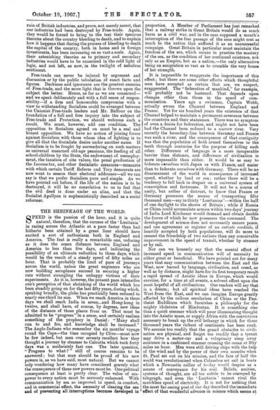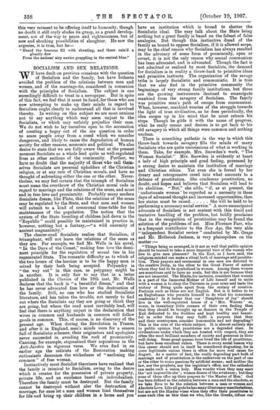THE SHRINKAGE OF THE WORLD.
SPEED is the passion of the hour, and it is quite natural, therefore, that the success of the Lusitania ' in razing across the Atlantic at a pace faster than had hitherto been attained by a great liner should have excited a sort of enthusiasm both in England and America. The feat is really a remarkable one, reducing as it does the ocean distance between England and America to less than five days, and indicating the possibility of an ultimate reduction to three days, which would be the result of a steady speed of fifty miles an hour. That is probably the limit of pace of journeys across the world, unless the great engineers who are now building aeroplanes succeed in securing a higher rate without strangling the unhappy victims of their experiments. As it is, however, the present pace intensifies one's perception of that shrinking of the world which has been steadily going on for the last fifty years, during which, speaking broadly, the globe has practically been reduced to nearly one-third its size. When we reach America in three days we shall reach India in seven, .and Hong-kong in twelve, and shall have, of course, by degrees, new ideas of the distance of those places from us. That must be admitted to be "progress" in a sense, and certainly realises something of the prophecy in Daniel : "Many shall run to and fro, and knowledge shall be increased." The Anglo-Indians who remember the six months' voyage round the Cape—the time occupied by Clive—must now be few indeed, but men over seventy recollect how they thought a journey by steamer to Calcutta which took forty days . was a moderately fast one. The later question, "Progress to what ? ' still of course remains to be answered ; but that man should be proud of his new powers is, as we have said, most natural. But we cannot help wondering bow many have considered gravely what the consequence of these new powers must be. One political consequence at least is pretty clear. The value of sea- power to every nation must be seriously enhanced. With communication by sea so improved in speed, in comfort, and in commercial effect, the necessity of clearing the sea and of preventing all intarruptions becomes developed in proportion. A Member of Parliament has just remarked that a railway strike in Great Britain would do as much harm as a civil war, and in the case supposed a month's interruption of the free passage of the seas might cost as much to the nation that suffered it as an unsuccessful campaign. Great Britain in particular must maintain the freedom of the sea, which means in practice the mastery of the sea, as the condition of her continued existence, not only as an Empire, but as a nation,—the only alternative being an emigration so vast as to crumble the very bones of her strength.
It is impossible to exaggerate the importance of this effect ; but there are some other effects which thoughtful men have accepted as certain that are, we suspect, exaggerated. The "federation of mankind," for example, will probably not be hastened. That depends upon changes other than those in the speed of com- munication. Years ago a swimmer, Captain Webb, actually swum the Channel between England and France. Yet for six hundred years the existence of that Channel helped to maintain a permanent severance between the countries and their statesmen. There was no symptom of even a desire for federation, and might not have been had the Channel been reduced to a narrow river. Very recently the boundary-line between Germttny and France was such a river, and the consequence of that contiguity was that the population of both armed themselves to the teeth through centuries for the purpose of killing each other. Difference of language is a more insuperable barrier than distance, and difference of civilisation is more impassable than either. It would be as easy to federate oarselves with Japan as with France, and easier than to federate ourselves with Germany. There will be no disarmament of the world in consequence of increased speed, whether by land or sea ; rather there will be a tendency to fall back in despair on a universal system of conscription and fortresses. It will not be a source of amity, but rather of distrust, to know that France or Germany possesses the means of transporting fifty thousand men—say in thirty Lusitanias '—within the half of one daylight to the shores of Britain ; while if Russia. or China could accumulate armies within two days' journey of India Lord Kitchener would demand and obtain double the forces of which he now possesses the command. The development of science does not necessarily ensure peace, and one agreement or register of an entente cordials, if heartily accepted by both populations, will do more tO cement the friendship of two nations than any conceivable improvement in the speed of transit, whether by steamer or by rail. Nor can we honestly say that the mental effect of increased speed in communication will of necessity be either great or beneficial. We have pointed out for many years that easy communication between the East and the West, now barred by language, civilisation, and creed, as well as by distance, might have for its first temporary result a rapid spread of Asiatic ideas in Europe, which would exercise, for a time at all events, a solvent effect upon the most hopeful of all civilisations. Our readers will say that is a dream ; but all spiritual ideas have reached the West from the East, and we can imagine Europe greatly affected by the callous secularism of China or the Pan- theist Buddhism which furnishes a philosophy for the mighty idolatries of Hindustan. It is something else than a quick steamer which will pour illuminating thought into the Asiatic mass, or supply Africa with the convictions necessary to break up the evil lethargy in which for three thousand years the richest of continents has been sunk. We assume too readily that the grand obstacles to civili- sation are physical, and forget too readily that a tyrant may drive a motor-car and a voluptuary sleep away existence in a cushioned steamer crossing the ocean at fifty miles an hour. Men were still driving ships with the help of the wind and by the power of their own muscles when St. Paul set out on his mission, and the fate of half the world was revolutionised when Columbus set sail in boats which a Newcastle collier of to-day would despise as a means of conveyance for his coal. Beliefs, amities, systems of thought, are all too subtle to be conveyed by telegraph, and even the Lusitania ' cannot rival the matchless speed of electricity. It is not for nothing that the most far-seeing poet of our day described the immediate effect of that wonderful advance in science which seems at this very moment to be offering itself to humanity, though no doubt it still coyly eludes its grasp, as a grand develop- ment, not of the way to peace and righteousness, but of new and shocking possibilities of slaughter. He saw the argosies, it is true, but he- " Heard the heavens fill with shouting, and there rain'd a ghastly dew
From the nations' airy navies grappling in the central blue."











































 Previous page
Previous page